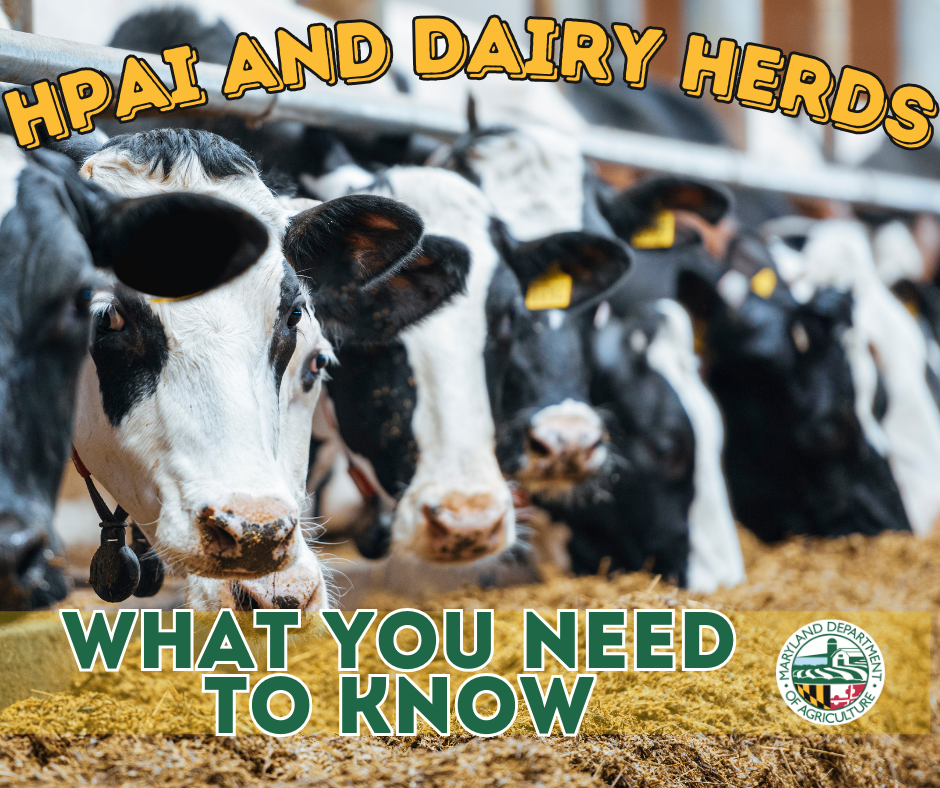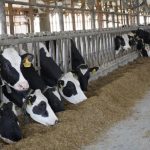
The Maryland Department of Agriculture today issued an order restricting movement of dairy cattle into Maryland from states with confirmed outbreaks of Highly Pathogenic Avian Influenza (HPAI) in their herds.
Last week, USDA announced detections of HPAI in dairy cattle herds in several states including Texas, Kansas, Michigan, Idaho, Ohio, North Carolina and New Mexico following increased illness and lower milk production rates among herds. USDA National Veterinary Laboratory Services confirmed the strain is H5N1, which has been circulating in the wild bird population for the last several years and appears to have been introduced to these herds by wild birds.
Although there have been no detections of HPAI in cattle in Maryland, producers are reminded to practice strong biosecurity. Cattle owners should minimize animal movements and isolate sick cattle. New animals should be quarantined for a minimum of two weeks before introducing them to an established herd.
“Maryland is home to a robust dairy and cattle genetics industry. The Maryland Department of Agriculture, in collaboration with state and federal partners, is actively monitoring and responding to this situation,” said Maryland Agriculture Secretary Kevin Atticks. “This order acts as another layer of protection for our Maryland farmers and ag industry partners.”
In addition to the confirmed detections in dairy herds, on April 1 a case of HPAI in a human was reported in Texas and confirmed by the Centers for Disease Control and Prevention (CDC). This isolated case does not alter the overall human health risk assessment for H5N1 bird flu in the United States, as the CDC considers the risk to the general public to be low.
The U.S. Food and Drug Administration has stated there is no concern about the safety of the milk supply or that this circumstance poses a risk to consumer health because products are pasteurized before entering the market. Additionally, dairies are required to send only milk from healthy animals into processing for human consumption. If milk from cows showing symptoms of illness or exposed to those infected with avian influenza is intended to be used to feed calves or other animals, the FDA strongly encourages that it be pasteurized or otherwise heat treated to kill harmful bacteria or viruses, such as influenza, before calf feeding.
Avian influenza, commonly referred to as “bird flu,” is a respiratory illness caused by an Influenza A virus in birds. The Centers for Disease Control and Prevention has confirmed that the risk of transmission of avian influenza between birds or cattle and the general public remains low.
To prevent the spread of avian influenza, the Maryland Department of Agriculture advises poultry and livestock owners to adopt the following biosecurity measures:
1. Make biosecurity a daily practice to safeguard your agricultural animals.
2. Stay vigilant for signs of illness and be familiar with the symptoms of infectious diseases.
3. Report any suspected agricultural animals to the Maryland Department of Agriculture by calling 410-841-5810.
4. Commercial chicken growers and backyard flock owners can seek guidance by emailing their questions about the outbreak to MD.Birdflu@maryland.gov.
You can now read the most important #news on #eDairyNews #Whatsapp channels!!!
🇺🇸 eDairy News INGLÊS: https://whatsapp.com/channel/0029VaKsjzGDTkJyIN6hcP1K

























